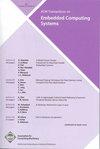交错磁记录的文件系统感知数据管理
IF 2.8
3区 计算机科学
Q2 COMPUTER SCIENCE, HARDWARE & ARCHITECTURE
引用次数: 0
摘要
交错磁记录(IMR)是一种新兴的用于硬盘驱动器(hdd)的记录技术,它以更低的成本提供更大的存储容量。通过将每个底部磁道与两个相邻的顶部磁道部分重叠(交错),基于imr的hdd成功地增加了数据密度,同时产生了一些硬件写入约束。为了更新每个底部磁道,必须读取和重写两个相邻顶部磁道上的数据,以避免丢失它们的有效数据,从而导致执行读-修改-写(RMW)操作的额外开销。因此,近年来研究人员提出了各种数据管理方案来减轻这种开销,旨在提高写性能。然而,这些设计并没有考虑到文件系统的数据特性,而文件系统是操作系统中用于向hdd中存储/检索数据的关键层。因此,由于不知道数据的空间局域性和热度,写性能的提高受到限制。为了提高系统的写性能,本文提出了一种文件系统感知的数据管理方案FSIMR。注意到同一目录的数据可能具有更高的空间局部性,并且大多同时更新,FSIMR在逻辑上将基于imr的HDD划分为固定大小的区域;属于同一目录的数据将被安排到一个区域,以减少查找待更新数据的时间(查找时间)。此外,区域内的冷数据被安排到底部轨道,并以异地方式更新,以消除RMW操作。我们的实验结果表明,与现有设计相比,所提出的FSIMR可以在不引入额外RMW操作的情况下减少高达14%的寻道时间。本文章由计算机程序翻译,如有差异,请以英文原文为准。
FSIMR: File-system-aware Data Management for Interlaced Magnetic Recording
Interlaced Magnetic Recording (IMR) is an emerging recording technology for hard-disk drives (HDDs) that provides larger storage capacity at a lower cost. By partially overlapping (interlacing) each bottom track with two adjacent top tracks, IMR-based HDDs successfully increase the data density while incurring some hardware write constraints. To update each bottom track, the data on two adjacent top tracks must be read and rewritten to avoid losing their valid data, resulting in additional overhead for performing read-modify-write (RMW) operations. Therefore, researchers have proposed various data management schemes to mitigate such overhead in recent years, aiming at improving the write performance. However, these designs have not taken into account the data characteristics of the file system, which is a crucial layer of operating systems for storing/retrieving data into/from HDDs. Consequently, the write performance improvement is limited due to the unawareness of spatial locality and hotness of data. This paper proposes a file-system-aware data management scheme called FSIMR to improve system write performance. Noticing that data of the same directory may have higher spatial locality and are mostly updated at the same time, FSIMR logically partitions the IMR-based HDD into fixed-sized zones; data belonging to the same directory will be arranged to one zone to reduce the time of seeking to-be-updated data (seek time). Furthermore, cold data within a zone are arranged to bottom tracks and updated in an out-of-place manner to eliminate RMW operations. Our experimental results show that the proposed FSIMR could reduce the seek time by up to 14% without introducing additional RMW operations, compared to existing designs.
求助全文
通过发布文献求助,成功后即可免费获取论文全文。
去求助
来源期刊

ACM Transactions on Embedded Computing Systems
工程技术-计算机:软件工程
CiteScore
3.70
自引率
0.00%
发文量
138
审稿时长
6 months
期刊介绍:
The design of embedded computing systems, both the software and hardware, increasingly relies on sophisticated algorithms, analytical models, and methodologies. ACM Transactions on Embedded Computing Systems (TECS) aims to present the leading work relating to the analysis, design, behavior, and experience with embedded computing systems.
 求助内容:
求助内容: 应助结果提醒方式:
应助结果提醒方式:


